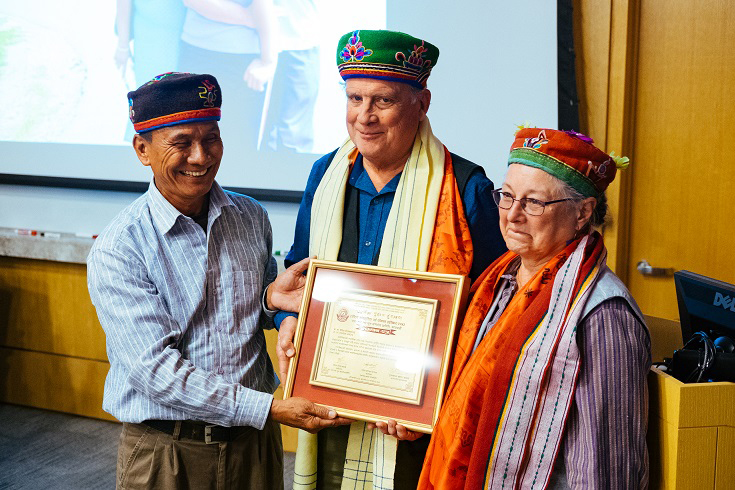Cornell's leadership in Himalayan studies celebrated
By Daniel Bass

More than two dozen Himalayan scholars gathered at Cornell last month to chart a way through a political and economic landscape that is increasingly hostile to area studies. In two days of presentations and discussions, the specialists in Nepal, India, Pakistan, Bhutan, Tibet and China argued that deep knowledge of local languages and cultures, especially in regions that cross national boundaries, provides critical insight into larger forces of globalization, from democracy formation to identity politics to economic migration.
“Nepal and Himalayan Studies at Cornell: Community Engagement, Knowledge Circulation, and the Future of Scholarship” was also meant to highlight the importance of Nepal and Himalayan studies to Cornell’s academic mission, and celebrate Cornell’s decadeslong leadership in Nepal and Himalayan studies worldwide. Cornell is the only academic institution in North America that regularly offers Nepali language courses at all levels.
In his keynote lecture, Michael Hutt, professor of Nepali and Himalayan studies at the School of Oriental and African Studies at the University of London, called on his fellow academics “to demonstrate that the research we do in and on Nepal enables us to order questions of a certain scale and magnitude with much greater credibility than scholars whose perspectives do not extend to any place other than their own.”
Hutt cited studies on the struggles over language, identity, modernity and tradition, such as his own collaborative work on the debate over a new Nepali national anthem and his graduate students’ work on the emergence of Nepali hip-hop, as producing “insights that amount to a great deal more than mere ‘translation’ and speak to the disciplinary agendas and concerns of those who conceive of themselves as global scholars.”
In a second keynote, Bandita Sijapati, research director at the Centre for the Study of Labour and Mobility at the Social Science Baha in Kathmandu, Nepal, spoke of the pressure on Nepal-based scholars to find a path between “the vagaries of state politics and policies, the shifting missions and mandates of international donor agencies,” and the research priorities of the communities in which they work.
Sijapati described the creative ways that Nepali nongovernmental organizations have found to fund basic research, contribute to wider intellectual discourse and develop research networks across the Himalayas. She suggested that independent research institutions like the Social Science Baha “can serve as a check against the often-talked-about ‘international intellectual division of labor’ whereby academic institutions and social scientists from the developing countries continue to import appropriate packages of ‘universal’ theory and, at best, export empirical data.”
Mark Turin, chair of the First Nations and Endangered Languages Program and associate professor of anthropology at the University of British Columbia, observed that scholars everywhere have much to learn from the way Nepali academics “have been deftly navigating the complexities of political instability, budget crisis and nationalist retrenchment for years.” These lessons are becoming increasingly salient around the world, Turin argued, including at North American universities.
The conference concluded with a dinner honoring recently retired Cornell anthropology professors Kathryn March and David Holmberg, who are known worldwide as trailblazers in Nepal and Himalayan studies. Many of the scholars and students at the conference studied under them at Cornell or in Nepal.
March and Holmberg, who are married, received a plaque signed by Nepal’s Prime Minister, Pushpakamal Dahal, thanking them for their decades of service and scholarship among the Tamang, an indigenous ethnic community. This “letter of honor with highest recognition” expressed “best wishes that [their] contribution, dedication and inspiring spirit to Nepal and Tamang society may spread all over Nepal and globe as exemplary model.”
The conference was co-sponsored by the South Asia Program, the Mario Einaudi Center for International Studies, the Office of the Vice Provost for International Affairs, Cornell Abroad, the Department of Anthropology, and the Association for Nepal and Himalayan Studies.
Daniel Bass is the manager of Cornell’s South Asia Program.
Media Contact
Get Cornell news delivered right to your inbox.
Subscribe